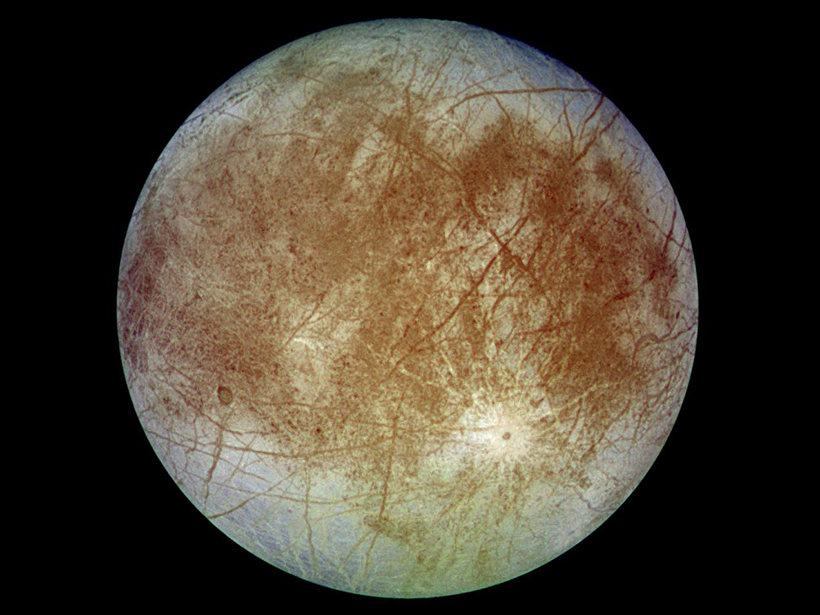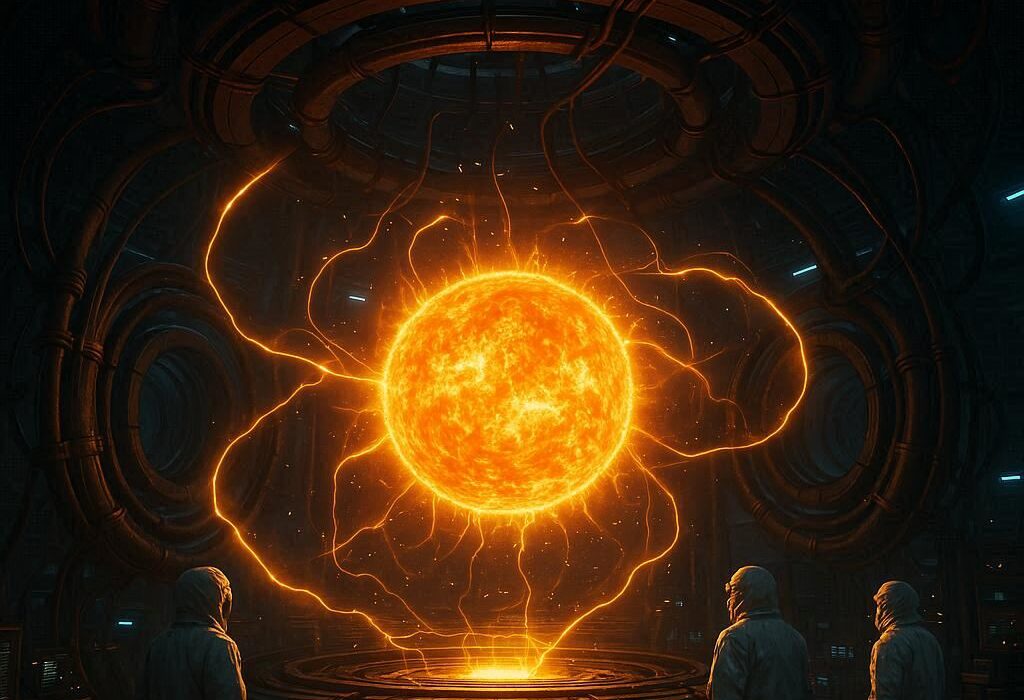From the earliest days of human imagination, we have looked to the skies and wondered whether other worlds could be homes for us. The Moon, our closest neighbor, has long carried that dream, but as our knowledge expanded, so too did our vision. We discovered worlds orbiting other stars, exoplanets where alien life might thrive, but even within our own solar system, two distant moons capture our attention with a haunting pull: Europa and Titan.
Europa, one of Jupiter’s many moons, gleams with a cracked, icy shell that hides a vast, global ocean beneath. Titan, Saturn’s largest moon, is cloaked in thick orange haze, with rivers and lakes not of water, but of liquid methane and ethane. These worlds are strange, hostile, and unimaginably different from Earth. Yet, paradoxically, they are also among the most promising places in our solar system to explore the question of survival. Could humans ever live there, even temporarily? Could we build colonies beneath Europa’s frozen skin or walk Titan’s alien shores?
The journey toward answering these questions is more than scientific curiosity—it is about confronting what it means to be human. To survive on worlds so hostile, we must carry not just technology but imagination, courage, and resilience. The dream of living on Europa or Titan is not only about escaping Earth, but about testing the limits of life itself.
Europa: The Ocean Beneath the Ice
Europa is a moon unlike any other. Slightly smaller than Earth’s Moon, it orbits Jupiter in a gravitational dance that continually stretches and flexes its interior. This relentless tug-of-war generates heat, keeping the moon’s subsurface ocean liquid despite its distance from the Sun. Scientists believe this hidden ocean could contain more than twice the amount of water found on Earth.
On its surface, Europa is an alien world of endless white plains scarred by cracks and ridges. The ice shifts and fractures as if the moon itself is alive, hinting at the restless ocean below. The surface temperature rarely rises above minus 160 degrees Celsius, and radiation from Jupiter bathes the surface in lethal doses. To walk unprotected on Europa would mean instant death, yet beneath its shell lies perhaps the most Earth-like environment in the outer solar system: a deep, salty ocean kept warm by hydrothermal vents, possibly rich in the chemistry of life.
For survival, humans could never remain exposed on the icy plains. Any habitat must be buried deep beneath the ice, shielded from radiation, and connected to the ocean below. Drilling through kilometers of frozen crust is a monumental challenge, but once achieved, an underwater habitat could float or anchor itself within Europa’s hidden sea. This ocean could provide not only water but perhaps energy sources and even food, if microbial or complex life exists there.
The dream of living under Europa’s ice evokes images of vast domes lit from within, surrounded by alien waters teeming with strange biochemistry. It is a place where humans would live not on the surface but in an inner world, a hidden sanctuary carved into the heart of an alien ocean.
The Harshness of Europa’s Environment
Yet the obstacles to survival on Europa are immense. The first and most obvious is radiation. Jupiter’s magnetic field traps charged particles, creating radiation belts thousands of times stronger than those around Earth. Europa lies directly within this invisible storm. An unprotected human on the surface would receive a lethal dose in just a few hours. Any base would need to be buried beneath tens of meters of ice or shielded by thick walls to make survival possible.
Temperature is another daunting challenge. At Europa’s frigid surface, no technology could survive without constant heating. Machinery, habitats, and spacesuits would require advanced thermal protection, energy sources, and insulation to withstand the cold.
Then comes the problem of access. How could humans reach the ocean? Estimates suggest the ice shell may be ten to twenty kilometers thick. No drill on Earth has ever cut through such a depth of ice in such extreme conditions. Melting tunnels with nuclear-powered heaters has been proposed, but maintaining stability and safety in the ice would be a Herculean task.
Still, the greatest challenge may also be the greatest opportunity: the unknown ocean itself. We know nothing of its currents, chemistry, or possible inhabitants. Could it harbor simple microbes, or even complex life? If so, our presence would risk contamination. We would need strict protocols to avoid altering or destroying whatever alien ecosystems might exist. Survival on Europa is thus not only a technical problem, but also an ethical one. To live there, we must respect the possibility that we are not alone.
Titan: Saturn’s Mysterious Moon
If Europa represents the hidden ocean, Titan represents the strange mirror of Earth. At first glance, Titan seems more promising for survival. Larger than Mercury, Titan has a thick atmosphere rich in nitrogen—the only moon in the solar system with such a blanket of air. Unlike Europa, Titan’s surface is shielded from radiation, making it safer for long-term habitation. From orbit, Titan appears as a hazy orange ball, its surface concealed by clouds. But spacecraft like Cassini and the Huygens lander have revealed a world both familiar and alien.
Titan has rivers and lakes carved into its surface, flowing and pooling like those on Earth. But here, the rivers are not made of water. Instead, they flow with liquid methane and ethane, hydrocarbons that exist in abundance at Titan’s frigid temperature of minus 180 degrees Celsius. Water on Titan is frozen as rock, forming mountains and bedrock beneath the hydrocarbon seas.
Titan’s atmosphere is so thick and gravity so low that a human with wings strapped to their arms could, in theory, fly. Its golden haze filters sunlight into a perpetual twilight, casting an eerie glow over methane seas and icy plains. To stand on Titan’s shorelines would be to gaze at a landscape both breathtakingly alien and strangely reminiscent of Earth.
For survival, Titan offers both hope and danger. Its atmosphere provides natural protection from space radiation, and its resources are abundant. Methane and ethane could be harnessed as fuels, nitrogen could support agriculture, and the abundance of organic molecules could form the foundation for life-support systems. Yet the bitter cold would demand extraordinary heating systems, and the lack of oxygen means every breath would require careful engineering. Titan, in many ways, is survivable—but only with technology beyond what we currently possess.
Challenges of Life on Titan
The dream of walking Titan’s surface comes with formidable challenges. The cold alone would make unprotected exposure instantly fatal. Spacesuits designed for Titan must resist cryogenic temperatures far below anything endured on Earth or even in space.
The atmosphere, though dense, contains virtually no oxygen. Any human colony would need to produce breathable air, either by importing it from Earth, splitting water ice into hydrogen and oxygen, or developing closed ecological systems. Agriculture, too, would face difficulties. Sunlight reaching Titan is only one percent of what reaches Earth, dim and filtered by the haze. Plants, if grown there, would need artificial light or advanced adaptations.
Energy is another critical issue. Solar power would be almost useless so far from the Sun. Nuclear reactors may be the only reliable source of energy. However, Titan’s abundant hydrocarbons offer an intriguing possibility. With oxygen, methane could be burned as fuel, providing both heat and energy. Titan could, in theory, become a fueling station for deeper journeys into the outer solar system.
Despite these obstacles, Titan feels strangely closer to the realm of possibility than Europa. Its atmosphere, protection from radiation, and abundance of resources give it an edge. A human base on Titan, nestled near the shores of a methane sea, feels like a dream that could one day come true.
Europa or Titan: A Question of Survival
Comparing Europa and Titan is a study in contrasts. Europa holds the promise of a vast liquid ocean, perhaps the best chance for finding extraterrestrial life in our solar system. Yet its environment is lethal, its surface bombarded by radiation and locked beneath kilometers of ice. Survival there would mean living beneath the surface, isolated in a dark ocean world.
Titan, by contrast, offers a thick atmosphere, relative safety from radiation, and a landscape that mimics Earth in strange, hydrocarbon form. It feels more hospitable, yet it challenges us with cold and the absence of oxygen. A colony there would rely heavily on technology but could exist on the surface, surrounded by alien skies and methane seas.
Both worlds demand ingenuity, resilience, and ethical consideration. To live on Europa risks contamination of a possibly living ocean. To live on Titan requires adaptation to an environment utterly alien yet tantalizingly familiar. Neither would ever be Earth, but both could push the boundaries of human survival into realms we have only dreamed of.
The Technology of Tomorrow
For survival on either moon, technology would be the lifeline. Habitats would need to be airtight, insulated, and powered by advanced energy systems. On Europa, habitats may be embedded deep into the ice, with submarines exploring the hidden ocean. On Titan, domed cities might rise beneath the orange haze, with greenhouses glowing from artificial light.
Spacesuits would be as vital as the skin itself, engineered to resist radiation on Europa or cryogenic cold on Titan. Transport systems would evolve—nuclear-powered submersibles on Europa, methane-fueled aircraft gliding through Titan’s dense atmosphere.
Such technology does not exist today, but the path to developing it is clear. Missions already planned, like NASA’s Europa Clipper and the Dragonfly mission to Titan, are the first steps. They will not carry humans, but they will reveal the secrets we need to unlock before any dream of survival can become real.
The Human Spirit of Exploration
In asking whether humans could survive on Europa or Titan, we are also asking something deeper: why do we want to? The Earth, for all its troubles, remains the only true cradle of life. Yet we reach beyond it, compelled by a restless spirit that refuses to be confined. Europa and Titan call to us not as safe havens but as challenges. They remind us that survival is not merely about biology, but about imagination, courage, and the will to adapt.
Perhaps one day, explorers will walk Titan’s dimly lit shores, or dive into Europa’s alien seas. They may never call these moons “home” in the way we call Earth home, but they will expand the definition of what is possible. Humanity’s story has always been about crossing boundaries—oceans, mountains, skies. The next frontier lies not across the seas, but across the void of space.
On Europa, survival would mean building sanctuaries beneath ice, lit by human ingenuity against the darkness. On Titan, survival would mean carving life out of an alien cold, turning methane and nitrogen into the building blocks of civilization. Both are dreams as dangerous as they are beautiful. And both whisper to us, in the silence of space, that perhaps humanity’s true destiny is not only to survive on Earth, but to learn how to survive wherever the universe allows us to try.
Conclusion: The Future Among the Moons
The question of human survival on Europa or Titan is not simply scientific speculation; it is a mirror held up to our species. It reflects our fears, our hopes, and our relentless drive to push beyond limits. Neither moon offers comfort. Both demand sacrifice, technology, and resilience on a scale we have never attempted. Yet within those challenges lies possibility.
If we succeed, even in small steps, we prove that humanity is not confined to one world. We prove that we can take the fragile spark of life and carry it across the cosmos. And whether on Europa’s hidden ocean floor or Titan’s twilight plains, that spark will shine as a testament to what it means to be human.






